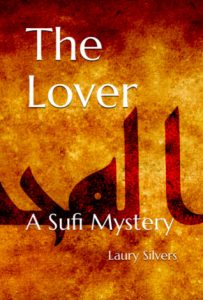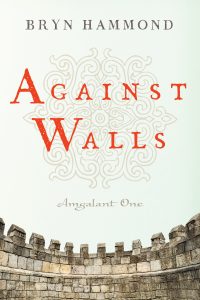Interview with Bryn Hammond and Laury Silvers
Julie Bozza interviewed women authors Bryn Hammond (Amgalant) and Laury Silvers (The Sufi Mysteries) about their historical fiction. One of the things their writing has in common is a vivid sense of their characters living in their own “present day”, rather than stuck in our past and perhaps limited by our hindsight. Julie has mostly written contemporary fiction, but is writing more historical fiction now, so she was curious about Bryn and Laury’s approach.
Bryn Hammond’s Amgalant trilogy deals with Genghis (Chinggis) Khan and 12th century Mongolia, exploring the peoples of The Secret History of the Mongols. Laury Silvers’s Sufi Mysteries are set in the bustling Baghdad of the 10th century, and are told from a refreshingly different perspective.
In both works, the stories vividly unfold in the characters’ “present day”, rather than feeling limited by our sense of history. Is this something you deliberately set out to do?

Bryn Hammond
Bryn: Early in the writing process I did phrase this to myself: that I wanted not to transport my reader into the past, but rather to make her feel she is with the Mongols in their present. I scarcely knew what I meant by it, let alone how to do it, but once in my head, I questioned at every step how to push the writing towards that result.
Laury: I had been imagining these great mystic women for so many years during my academic research; now I finally got to let go and tell their story. I kept wondering what it would be like to be the child of such fierce and committed women, for whom God was a more encompassing and pressing love than her children. I wanted to show a complicated and human sanctity. But as Bryn says, how to do it is the nub!
Do you have a favourite example of it in your own work?
Bryn: Not my favourite – I have doubts to this day – but my most blatant example. I felt daring to have a twelfth-century Mongol say, “It’s modern.” He says this about the execution method Jin China used on the Mongols’ khan Ambaghai: a contraption called a wooden donkey in mockery of the horse peoples of the steppe. For the people in that scene, this was a new twist on atrocity, and they have a sense of the world taking a turn to the cynical, the debased and the horrific. I thought we’d relate to their feelings if I invoked our idea of modernity in its negative associations.
Laury: I love Bryn’s example! I think for me, it is when women, free and enslaved, articulate their experience of having their bodies under male control and show us the ways in which they manage to survive but also live with dignity. There are those who argue that because “sexual consent” is a modern, contemporary idea that women could not have experienced unwanted sex negatively or as rape in a way we do now. Yet, as a historian, I can assure you that there are historical sources proving that women did experience unwanted sex negatively and in sometimes desperate terms. I wanted to give voice to that experience through my characters’ experiences. I do not detail these in the book; rather, the legacies of such events are felt in the lives of the women, and I believe felt by readers now because we can relate. Sexual violence is timeless.
Bryn: This is a powerful aspect of your novel, Laury. Your answer reminds me, I still have an uncertainty as to how people – ordinary, free people – might have experienced a lack of control over their lives such as you and I would find uncomfortable. I don’t want to assume common Mongols were fine with it because they knew nothing else.
Laury: I felt you handled the abduction of Hoelun at the start of Amalgant: Against Walls really well. I got that while this was the way things were done, she did not like it at all yet she also saw how to pivot her situation, demand dignity for herself, and ultimately make a life of greatness for herself. Immediately you know her to be a great woman. I found the scene very compelling. I could not look away from the page.

Laury Silvers
What techniques or approaches did you use to achieve this sense of the present?
Laury: Although people in different times and places experienced things differently than we do now, I do not believe, given my research, that difference is as radical as our postmodern selves like to assume. In The Lover: A Sufi Mystery, I focused on the experiences that bind us as people across time and place – like loss, fear, love, and happiness – and I gave them form in historically accurate circumstances.
For instance, my two main characters, Zaytuna and Ammar, desperately want justice for the vulnerable. They see the weak and the dispossessed of Baghdad and are angry that they cannot change it all. Don’t we feel this way? Few witness suffering without being touched by it. But while they feel the desire for justice as we do, they seek justice in ways that are appropriate to their time and place. For Zaytuna, as a Sufi, God wills all things, even suffering, so while human beings are meant to work to set things right, they also must come to accept the nature of things. For Ammar, as a Shia, human beings are responsible for such suffering, not God, thus there can be no acceptance in the end, only the struggle to restore dignity for all.
Bryn: I suspect it’s about the little things, such as favouring words like “now”.
I think my addiction to slang and idiom also comes into this answer. The danger in writing people’s voices from the past is to be overly formal – as the written records are. These documents skew towards formality, officialdom, and precis. We don’t hear people as they spoke, unless we have fiction from the time that tries to imitate real speech. Since my novels are heavy on conversation, my corrective is to concentrate on lively voices, which involves slang, idioms and figures of speech. This avoids the trap in historical fiction of limiting people’s language to a narrower range than ours, and sounding stiff and stilted.
Is there something about your story’s setting that prompted this dynamic feel?
Laury: When I read the past it feels present for me. For example, there are letters written on clay tablets from ancient Mesopotamia that articulate the most banal and richly human emotions. One sister demands of another, “Did you take my necklace!” A father scolds his son for “whoring and gambling” instead of studying at scribal school. The past demands a present feel because so little has changed.
Bryn: Chinggis Khan supervised such significant change on the steppe that some scholars talk of a “Chinggis revolution”. It seems vital to instil a sense of presentness and of a future that hasn’t happened yet, when writing a social revolution. In Against Walls, women and children are left to survive after a disastrous battle that killed husbands and fathers. It’s the young people who start the ball rolling again, in a different direction – and young Temujin (the future Chinggis) got his start by inspiring his contemporaries. So I needed that sense of newness and nowness, the excited spirit of young people who believe “we can change everything”.
What did you want to achieve with this “present day” sense?
Laury: The issues that faced Muslims in the past are similar to the issues that our community, globally, faces in the present. But Muslims tend to project the idea of a simpler time onto the past. Everyone does this with their own pasts. Many Muslims see early Islam as unified and glorious. Many non-Muslims see it as unified and a horror. It is none of those things. I wanted readers, Muslim and non-Muslim alike, to see the beauty in all the complicated mess of our humanity then and allow us to love ourselves in our complicated mess of humanity now.
Bryn: My first and last purpose in writing is to render these people fully human. It’s easy to reduce people whom we know only in fragments from the past. Worse, the people I write about – steppe nomads, Mongols – tend to be further dehumanised by reductive stereotypes. To present them as fully human was my war cry from the start. Immediacy in the writing helped me do so.
It’s also about the stakes. To convey the dangers they were in, the mistakes they nearly made, their own uncertainties, their view of a horizon of possibilities open to them – for all this, I want the reader to forget she’s in the past.
Do you have any examples of other historical fiction that has the same “present day” feel?
Bryn: Hilary Mantel, A Place of Greater Safety. I frankly don’t know how she achieves her effects. My impression is that she simply dismisses from mind the idea that she’s writing a “historical”; she’s writing a novel. Her work gets described as like a contemporary novel, like a literary novel that happens to be set in the past. She doesn’t let “historical” weigh her down or impinge on what she can do.
I want to talk about a historian as well. Peter Perdue urges historians not to use hindsight: he stresses contingency, indeterminacy, the accidental as well as human agency; he writes a seat-of-the-pants history that always might have turned another way. He’s right that history is often written as if what happened next was inevitable. Novelists need to get away from that. To read him on his method was to hear a novelist’s creed. We want to convey the past as it was experienced, not as seen from our standpoint. He helped teach me to abandon hindsight and explanations after the fact, to look at situations from the perspective of people at the time.
Laury: To me, the touchstone is Umberto Eco’s The Name of the Rose. He perfectly grasped the pettiness, ugliness, intellect, curiosity, desires, beauty, and subtle faith of people committed to a religious vocation. He showed the deep theological and political divisions and differences, as well as loves in common, that people of the same faith can share – and what they will do to protect them. It was a whole world in all its complexity. The trick was bringing Sherlock Holmes, an utterly modern man, into the past. Eco did so seamlessly and it created a bridge for us to follow him there. I hope I’ve created a bridge in my work through my characters’ experiences and drives.
What are you working on now?
Laury: I’m close to finishing a near-to-final draft of The Jealous, the second of The Sufi Mysteries. There will be five books in total. Each book follows Zaytuna’s arc on her journey to wholeness … as she solves crimes … and the complicated lives of the people of the Abbasid past: An African-Arab cop and former frontier fighter, a Turkmen nosy neighbour, a Persian religious scholar, a Chinese mystic savant, corrupt scholars, slaves, famous Sufis, beggars, criminals, friends, tavern owners, indentured servants, and washerwomen.
Bryn: The third and final book of Amgalant, which is at an advanced stage of draft. It’s a vast canvas, with research needs vast too. From a new style of popular opera in China, to the Mongols’ early globalisation of trade, I want to portray as much as I can of what happened when this steppe society clashed and integrated with the Chinese and Iranian worlds. That, while my focus remains very much the life of Temujin. “Intimate epic” is how I describe my trilogy.
#
About Laury Silvers
Laury Silvers is a North American Muslim of the Sufi variety and a retired academic and activist. She lives in Toronto. The Sufi Mysteries arise out of her desire to talk about the people and places she researched as a scholar of early Islam and Sufism beyond the constraints of academic skepticism. They are her love song to these early Muslims as human beings—who lived in a particular historical moment with all its complications—and to her experience of Islam.
About Bryn Hammond
Bryn Hammond lives in a coastal town in Australia and writes with as few distractions as possible. Her study of medieval literature led through the epics, sagas and romances of Europe to the thirteenth-century Secret History of the Mongols, which seized her and hasn’t let go for sixteen years. The Amgalant series is her interaction with this wonderful text.
About the interviewer
Julie Bozza is an author of (mostly!) queer romance and queer fiction, with an occasional diversion into alternate history and Gothic fantasy. Over the years, her themes have focused more and more on how extraordinary ‘ordinary’ people can be, and on the hard but crucial work involved in being good. Heroes in literature and life include Jane Austen, John Keats, and Virginia Woolf.
About The Lover: A Sufi Mystery
 Baghdad, 295 Hijri (907 CE)
Baghdad, 295 Hijri (907 CE)
Zaytuna just wants to be left alone to her ascetic practices and nurse her dark view of the world. But when an impoverished servant girl she barely knows comes and begs her to bring some justice to the death of a local boy, she is forced to face the suffering of the most vulnerable in Baghdad and the emotional and mystical legacy of her mother, a famed ecstatic whose love for God eclipsed everything.
The Lover is a historically accurate mystery that introduces us to the world of medieval Baghdad and the lives of the great Sufi mystics, washerwomen, Hadith scholars, tavern owners, slaves, corpse washers, police, and children indentured to serve in the homes of the wealthy. It asks what it means to have family when you have nearly no one left, what it takes to love and be loved by those who have stuck by you, and how one can come to love God and everything He’s done to you.
Like Eco’s Name of the Rose and Pamuk’s My Name is Red, the mystery of The Lover is not just in finding out “who did it,” but in discovering the emotional and social worlds of the characters, a world in which theological and legal debates can have deadly outcomes and lives of everyday people hang in the balance.
Amazon link: https://www.amazon.com/dp/1999122844/
About Amgalant: Against Walls
 In the steppes of High Asia, the year 1166…
In the steppes of High Asia, the year 1166…
‘What is a Mongol? – As free as the geese in the air, as in unison. The flights of the geese promise us we don’t give up independence, to unite.’
The hundred tribes of the Mongols have come together with one aim: to push back against the walls that have crept onto the steppe – farther than China has ever extended its walls before. Walls are repugnant to a nomad. But can people on horses push them down, even with a united effort?
This story begins when nobody has heard of Mongols – not even most Chinese, who think the vast Northern Waste at its weakest and are right. A spectacular history starts obscurely…
Against Walls is the first in a trilogy that gives voice to the Mongols in their explosive encounter with the great world under Tchingis Khan. Both epic and intimate, Amgalant sees the world through Mongol eyes. It’s different from the world you know.
‘Total and instant immersion… thoroughly compelling and powerful.’ – Asian Review of Books
Universal buy link: https://books2read.com/AgainstWalls
Category: Contemporary Women Writers, Interviews, On Writing






























